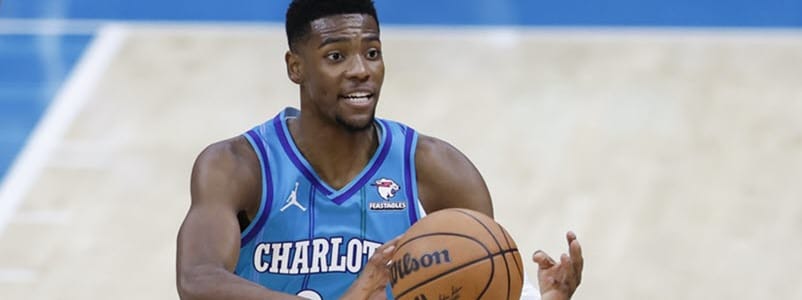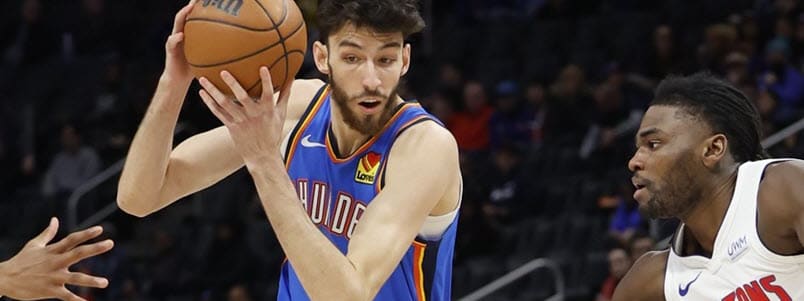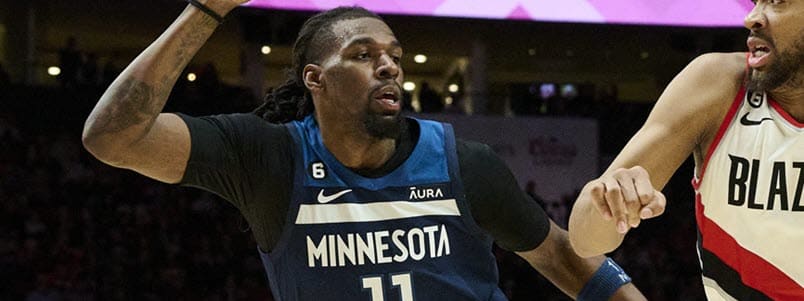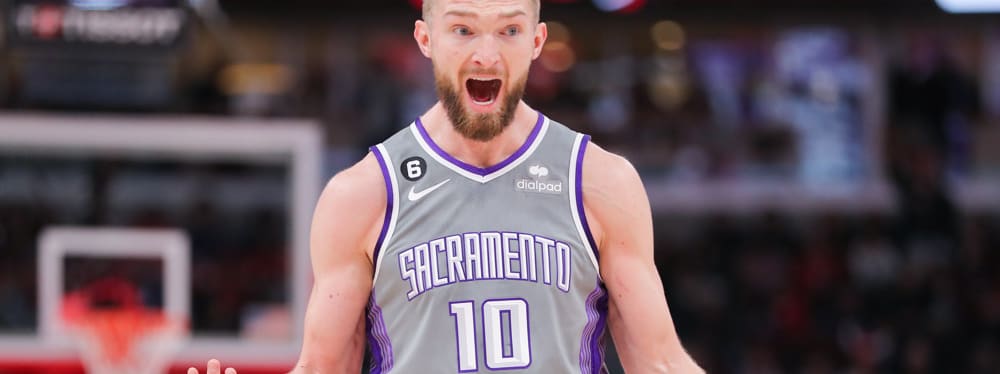Recent RotoWire Articles Featuring Gordon Hayward
See More
Now age 33, Hayward is coming off his worst season since his rookie campaign, not including his injury-ravaged season in 2017-18. He closed 2022-23 outside the top 150 in nine-category formats, averaging 14.7 points, 4.3 rebounds, 4.1 assists and 1.0 combined steals and blocks. He has played fewer than 55 games in four straight years, a worrying trend for anyone considering him in fantasy leagues. The Hornets welcome back Miles Bridges this season, as well as the number two pick in the 2023 NBA Draft, Brandon Miller. Both will undoubtedly take minutes away from the aging veteran, leaving him as potentially nothing more than a role player. When he was healthy last season, he flashed the ability to contribute across multiple categories, something he has been able to do throughout his career. He has had multiple top-50 seasons but appears to be on a downward trajectory. Perhaps by managing his minutes, the Hornets will be able to extract a bit more out of Hayward, reducing the stress on a body that has had its fair share of war wounds. He is not someone managers will need to prioritize in drafts, but if he can remain healthy, he will likely be a waiver wire target at times throughout the season.
Hayward's numbers dipped a bit in his second season in Charlotte, as his per-game averages of 15.9 points, 4.6 rebounds, 3.6 assists, 1.8 three-pointers and 1.0 steals were down from his previous campaign. The drop-off was due partly to a reduction from 34 to just under 32 minutes per contest of playing time, though it's also notable that the veteran forward recorded his lowest field-goal percentage (45.9 percent) in six seasons. More significantly, Hayward again had trouble staying on the court. He played in only 49 games, including just one after Feb. 7. It marked the third consecutive season during which he has missed a significant chunk of time, and he has played in only one contest during the period of fantasy playoffs over the past two campaigns. Fantasy managers tend to remember such things, and the combination of injuries and dropping numbers make it reasonable to expect him to fall further down draft boards for the coming season. There's still reason to like Hayward's well-rounded game, and the likely absence of restricted free agent Miles Bridges, who is facing serious legal consequences after being charged with three felony counts of domestic violence in the offseason, could result in Charlotte looking more to Hayward to fill the void. However, he will be 32 years old entering the 2022-23 campaign, which doesn't bode particularly well for his chances of suddenly regaining season-long health.
In his first season with the Hornets, Hayward averaged 19.6 points, 5.9 rebounds, 4.1 assists and 1.2 steals in 34.0 minutes per game. It wasn't quite the resurgence that some were expecting as he transitioned from being a number three or four option in Boston to the top option in Charlotte. However, he did finish with his highest points per game output since his final season with the Jazz when he averaged 21.9 points per game and finished 33rd overall in fantasy scoring. Hayward has certainly regained his form as a solid fantasy producer. On a per-game basis, the Butler product has finished 52nd and 54th respectively in his past two seasons. The 31-year-old shot efficiently last year, converting 47.3 percent from the field, 41.5 percent from three and 84.3 percent from the free-throw line. However, injuries remain an issue as Hayward has missed 20-plus games in back-to-back seasons. If healthy, Hayward should benefit from the playmaking abilities of reigning Rookie of the Year LaMelo Ball and finish as a top-60 fantasy producer for the third straight season.
After three seasons in Boston, Hayward will find himself in Charlotte after signing a massive four-year, $120 million contract with the Hornets. After being the third or fourth option at times on the Celtics, Hayward now goes to a team where he'll be the clear-cut best player. As a result, the 30-year-old should take control of a bigger piece of the offense than he did with the Celtics. That makes it possible for Hayward to return to the kind of production that made him an All-Star in the tough Western Conference during the 2016-17 campaign. That season, he ranked 33rd in fantasy on a per-game basis, averaging 21.9 points, 5.4 rebounds, 3.5 assists, 2.0 threes and 1.0 steals in 34.5 minutes. Health and age are a concern since Hayward missed 32 games last season between the regular season and playoffs, but he'll unquestionably be in position to have one of his best seasons if he can remain on the court.
Expectations were high last fall when Hayward returned to the starting lineup in October after essentially missing all of 2017-18 to an ugly ankle injury. But after 15 starts, it was clear that Hayward had yet to return to his pre-injury form. Then coach Brad Stevens inserted Marcus Morris and Marcus Smart into the starting lineup, moving Hayward and Jaylen Brown to the bench. Hayward appeared relieved, but his play was inconsistent all winter long. He closed the season out with an eight-game run of 16.4 points on 58.5 percent shooting, 6.0 rebounds and 3.0 assists, sparking hope he might return to almost-star-level performance just in time for the playoffs. But his inconsistencies returned during the postseason. Now, combined with new arrival Kemba Walker, the triumvirate of Hayward, Jayson Tatum and Walker are expected to lead Boston's scoring efforts. But another slow start from Hayward could once again force him to the bench, especially if Jaylen Brown returns to 2017-18 form.
Yes, the Celtics did well last season without Hayward, but the reality is they were able to take advantage of a weak Eastern Conference. While the West is still king, let’s not forget Hayward averaged 20 points, five boards and almost four assists per game during his last healthy season. Hayward's outside shooting and ability to create his own shot are exactly what Boston’s offense needs, and his defensive flexibility is perfect for coach Brad Stevens’ rotating scheme. It's fair to question how Hayward will bounce back from such a devastating injury, but before breaking his ankle on national television, Hayward averaged 73 games played over his previous seven seasons. If you're of the belief that Hayward will return to his usual, durable self, he could end up being a major Fantasy steal, should he slip to the later-middle-rounds. Perhaps the bigger concern is how the presence of Jayson Tatum and Jaylen Brown -- two of the better young wings in the league -- will impact Hayward's role. The presumption is that Hayward will be the No. 1 option on the wing, but just how many minutes and possessions per game he'll inherently have to cede to Tatum and Brown is one of Fantasy's biggest question marks heading into the season.
After seven seasons of continuous improvement in Utah, top free agent Gordon Hayward made the big jump to Boston, reuniting with his college coach, Brad Stevens. The move certainly improves Hayward’s chances of making his first NBA Finals, as the small forward will now avoid the meat grinding process of the Western Conference playoffs. But will Hayward’s scoring decrease in an effort to appease new teammates Kyrie Irving and Al Horford? Last year in Utah, no teammate came close to Hayward’s 15.8 shot attempts per game. But Irving, taking Isaiah Thomas’ spot, attempted 19.7 shots per game last year for Cleveland and is expected to continue gunning for Boston. It will be interesting to see how Hayward handles being the second option. Expect Stevens to design offensive sets that play to Hayward’s strengths. The more curious dilemma for Stevens could be how to develop first round picks Jaylen Brown and Jayson Tatum, both small forwards, when arguably the franchise’s best player is deeply entrenched above them on the depth chart. But that isn’t Hayward’s problem. Expect the kids to play out of position while Hayward and Irving form one of the league’s most dynamic duos.
While his production didn’t take a quantum leap forward in 2015-16, Hayward still managed to increase his scoring for a fifth straight season, averaging a team-high 19.7 points per game. Without key contributors Derrick Favors, Rudy Gobert and Alec Burks around for large swaths of the season while each battled injuries, Hayward was forced to shoulder more of the offensive burden than anticipated, resulting in his efficiency from the field (43.3%) and three-point range (34.9%) taking a step back from the year prior. Those slippages notwithstanding, Hayward is still undeniably the Jazz’s go-to option, and his helpful contributions in assists and rebounds have turned him into one of the top fantasy players at his position and a borderline All-Star. With the Jazz beefing up their roster this offseason by adding veterans George Hill, Joe Johnson and Boris Diaw and getting Dante Exum back from a torn ACL, Hayward will be surrounded by more talent than ever before during his time in Utah, which could be a double-edged sword of sorts. While the Jazz attack now profiles as more of a well-oiled machine that should be capable of taking some of the pressure off Hayward to create offense, it also means that there’s more mouths to feed, likely translating to fewer shot attempts and minutes for the small forward. Hayward’s percentages and the field and three-point land may stand to benefit from the team’s roster construction, but a slight downturn in counting stats is likely in store. Even if his scoring dips for the first time in his career, Hayward’s good track record of health (he’s missed no more than 10 games in a season) and ability to chip in across other categories shouldn’t result in a significant downgrade of his fantasy stock.
Hayward remains the face of the franchise in Utah as he'll be entering his sixth year in the NBA this coming season. The pride of Butler averaged a career-high 19.3 points a year ago and tacked on an impressive 4.9 rebounds, 4.1 assists, 1.4 steals, 0.4 blocks, and 1.6 three-pointers over the course of 76 outings at a rate of 34 minutes per game. All told, Hayward put together yet another season where he helped out in every category across the box score, and he even was able to raise his shooting percentage to 45 after suffering four consecutive seasons of decrease which bottomed out at 41 percent last year. A return to the 49 percent from the floor during his rookie campaign back in 2010-11 is a bit unreasonable since he garners significantly more attention from defenders these days, but another showing of last year's total will keep him right at the league average of 45 percent from the 2014-15 season. The fact that he's the central cog in Utah's offense makes it hard to imagine he could improve on his counting stats from last season, however, as he tends to warrant attention from an opposing team's best on-ball defender on any given night, leaving little room for Hayward to surpass his production in previous years.
Gordon Hayward is entering his fifth season in the NBA after finalizing a max deal worth $63 million in the offseason. While the price tag for regaining his services was high, the Butler alum contributed across the board last season by averaging 16.2 points, 5.1 rebounds, 5.2 assists, 1.4 steals, 0.5 blocks, and 1.1 three-pointers in 36 minutes per game. He played mostly at shooting guard last season but will likely shift down to his more natural fit as a small forward under the direction of new head coach Quin Snyder. Despite being a workhorse for the Jazz, the 24-year-old managed to stay relatively healthy as he played and started in 77 games for a disappointing Jazz squad. Hayward has proven throughout his career that he can contribute in all facets of the game, but he struggled mightily with his shot last season. In fact, his average from the field has decreased over his four years in the league, culminating in a lowly 41-percent shooting from the field in 2013-14. Regardless of his shooting woes, Hayward will be the featured offensive weapon for the Jazz this upcoming season as they look to rebuild with him as the face of their franchise.
Everything remained pretty constant for Hayward from 2011-12 to last season, except that his three-point shooting percentage jumped from 35 percent to 42 percent, aiding a spike in scoring from 11.8 points to 14.1 points per game. The only spot on the Jazz's roster with any semblance of depth is the wing, with Hayward, Alec Burks, Marvin Williams, Brandon Rush and Richard Jefferson all in the mix for playing time. Knowing this, it's hard to predict a bump in playing time for the fourth-year player, even if his performance would typically dictate such. Although a player standing 6-8 would seemingly possess the length to help out in defensive categories while matching up against smaller guards, that's not really Hayward's game, as he has career highs of 0.8 steals and 0.6 blocks per game - numbers that are unlikely to increase any time soon. Scoring, three-point shooting and free-throw percentage are the three areas where owners can expect solid production from Hayward.
Hayward had a breakout sophomore season last year, thanks mostly to seeing almost twice as many minutes per game (30.5) than he saw as a rookie. He shot 45.6 percent from the field, 34.6 percent from downtown, and 83.2 percent from the line en route to averaging 11.8 points per game. Hayward’s versatility as a good distributor and average rebounder was seen in his averaging 3.5 boards and 3.1 assists. It’d be nice to see him average more than 0.8 steals, but his 0.6 blocks per game add up over the course of a season. Just 21 years old, Hayward averaged 37 minutes per game in the final month of last season and appears poised to carry the load as the starting shooting guard or small forward for the Jazz this season. Veterans Randy Foye and Marvin Williams will fight to get significant playing time, and youngsters Alec Burks and DeMarre Carroll should also see minutes. With his youth and ability to shoot from anywhere on the court, Hayward is worth a middle-to-late round pick.
At 6-8, Hayward will likely be splitting time at both shooting guard and small forward in the 2011-12 season. He started many of the games in the second half of his rookie season and played very well. He may begin his sophomore campaign continuing to come off the bench as a versatile sixth man, but as he develops, he could slide into a starting spot at either the two or three position.
Gordon Hayward was a big-time player at Butler who the Jazz drafted this year with the ninth pick in the draft. He has the skills of a guard and the height of a power forward and should be able to play multiple positions ranging from the two to the four. His playing time could increase throughout the year as he develops.














